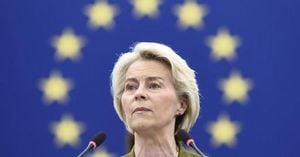In a remarkable shift in the landscape of cryptocurrency regulation, Michael Saylor, the founder of MicroStrategy, has publicly praised the U.S. Federal Reserve (Fed) for its recent decision to allow banks to hold Bitcoin freely. This change is seen as a pivotal moment for the cryptocurrency market, which has been experiencing significant volatility and speculation. Saylor took to the X platform to announce, "Banks can now start supporting Bitcoin," signaling a new era for digital assets in the financial sector.
The Fed's newfound openness towards cryptocurrency comes after years of stringent oversight and warnings about the risks associated with digital currencies. Historically, the Fed had advised banks to exercise caution, emphasizing the potential dangers of digital assets to financial stability. In a 2022 memo, the Fed had clearly stated, "The digital asset sector, while promising, poses risks to stability, consumer protection, and the overall safety of the financial system." However, the recent announcement on April 24, 2025, indicates a significant policy shift aimed at fostering innovation within the financial industry.
As the Fed adopts a more supportive stance, the price of Bitcoin has surged, recently surpassing $95,500, reflecting growing enthusiasm among investors. This bullish trend has been bolstered by statements from Donald Trump, the current president, who has openly advocated for cryptocurrency-friendly regulations. Trump noted that Bitcoin and digital assets represent a crucial economic opportunity that should not be overlooked. Following his electoral victory, he has prioritized policies that would further support the growth of Bitcoin, pushing its price to a remarkable high of $109,000 in a short period.
In addition to Saylor and Trump, the financial sector is closely monitoring the leadership changes within regulatory bodies, particularly the appointment of Paul Atkins as the new head of the Securities and Exchange Commission (SEC). Atkins is viewed as a supporter of digital assets, and Saylor remarked on this development in a post on X, stating, "SEC Chairman Paul Atkins will be beneficial for Bitcoin." This sentiment reflects a broader optimism within the investment community, as traditional investors who were previously hesitant about cryptocurrency are now beginning to take a closer look.
The convergence of supportive regulatory changes and rising Bitcoin prices has led many analysts to believe that the cryptocurrency market has reached a turning point. The Fed's policy shift, coupled with Trump’s aggressive push for pro-crypto regulations, could potentially elevate digital assets from a niche market to a mainstream financial instrument.
Meanwhile, the Bitcoin market is not just reacting to domestic developments. Analysts from Deutsche Bank, including George Saravelos and Tim Baker, have pointed out that the U.S. dollar may be on the verge of significant depreciation. They attribute this potential decline to rapid changes in U.S. trade policy and a reevaluation of America's global leadership position. The analysts suggest that the era of a strong dollar may be coming to an end, which could further enhance Bitcoin's appeal as an alternative asset.
As the dollar weakens, Bitcoin is increasingly seen as a safe haven for investors seeking to hedge against inflation and currency fluctuations. Jay Jacobs, head of U.S. Thematic & Active Equity ETFs at BlackRock, has also weighed in on the situation, asserting that the ongoing geopolitical fragmentation will create a "Megaforce" that could significantly impact Bitcoin. In an interview with CNBC, Jacobs noted that as uncertainty grows, more individuals are looking for secure alternative assets, and Bitcoin is well-positioned to fulfill that role.
Jacobs emphasized that Bitcoin is beginning to decouple from its traditional correlation with technology stocks, suggesting that it may operate more independently in an uncertain economic environment. This evolving relationship between Bitcoin and the broader market is crucial for investors to understand as they navigate the complexities of the financial landscape.
With both the Fed's policy changes and the political landscape shifting in favor of cryptocurrencies, the stage is set for Bitcoin to potentially become a mainstream asset class. The combination of regulatory support, rising prices, and increasing acceptance among traditional investors could lead to a significant transformation in how digital currencies are perceived and utilized.
As the cryptocurrency market continues to evolve, investors and regulators alike will be watching closely to see how these developments unfold. The potential for Bitcoin to emerge as a dominant force in the financial system is becoming more tangible, with implications that could resonate throughout the global economy.
In conclusion, the recent changes in U.S. policy regarding Bitcoin, alongside the growing support from influential figures like Michael Saylor and Donald Trump, may signal a new chapter for digital assets. As Bitcoin's price continues to soar and regulatory barriers begin to dissolve, the future of cryptocurrency looks increasingly promising.




